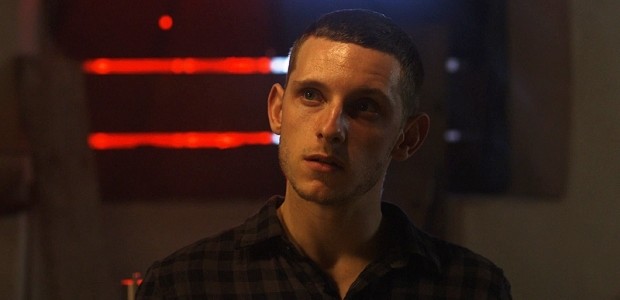As a debut writer/director, Carl Tibbetts’ Retreat is a well-made psychological thriller with steady increase in pacing that generates an atmosphere going from brooding to disturbing. Only accessible by ferry, the story unfolds on a little island off the coast of Scotland where a married but childless couple rents a rustic cottage. Soon after their arrival on the island, it is evident that Kate and Martin have seen happier times. A journalist, Kate is withdrawn but reveals through her writing that a previous miscarriage has caused a rift in their relationship. In an effort to rekindle their marriage, Martin tries to put the past behind, hoping happy memories of their previous stay on the island will seal their marital wounds once and for all. But as it seems, things get from bad to worse when their only contact with the mainland – a CB radio – malfunctions, and the cottage’s power generator chokes out. Amongst all this, an injured soldier arrives on the island and amplifies their predicament, stating that an air-borne virus is rapidly sweeping across Europe. Claiming the outbreak to be extremely lethal, Jack proceeds to board-up the cottage from the inside, even as it dawns on Kate and Martin that their strange guest is becoming increasingly hostile.
Although widely comparable to the Nicole Kidman-Sam Neill thriller Dead Calm, Tibbetts’ work here is mostly captivating, relying heavily on portrayals from Thandie Newton and Cillian Murphy as the couple, and Jamie Bell as the antagonistic home intruder. As such, acting is the pivotal structure steadily holding up the plot build-up. Bell is particularly impressive as an alpha male that goes on to challenge Martin’s manhood right before his wife. As soon as Bell’s character enters, we know the premise calls for psychological confrontation as two men try to outsmart each other. Add to that a fragile and hurting woman in between, and the stage is set for a tension built battle for survival. Tibbetts’ screenplay also affords equal opportunity to Newton and Murphy as they each share moments of power in trying to outsmart Bell’s Jack. This is evident that although there is a growing wedge in their relationship, previous problems diminish in size when faced with what they must now do to protect each other and their marriage.
With a good part of the plot carried out within the confines of the cottage, Tibbetts succeeds in holding on to the viewer’s attention despite the fact that single locale films can become boring. Besides the aforementioned acting, what works for Tibbetts is the premise – a broken married couple alone on an island, faced with a life threatening situation where they are forced to reconcile their past, or die trying. With all the twists and turns in the second half, Tibbetts gives hope to the audience while simultaneously tightening the noose around Kate and Martin. This alone reduces viewer predictability while also giving the ending a disturbing albeit open-ended finish. Personally, I was hoping for a satisfying ending, but as it seems, Tibbetts may have had other things in mind like connecting the viewer with his characters and then brutally severing that connection; it’s like saying hope is as useful as a missed opportunity.
All things considered, this film is a decent attempt for a film maker writing and directing his first movie. For a thriller, plot twisters keep gnawing at the nape of your neck, with some good acting swelling said plot with tense moments. Curiously, the ending may disappoint some viewers, especially those who are optimistic about feel-good endings.
Rating: 




